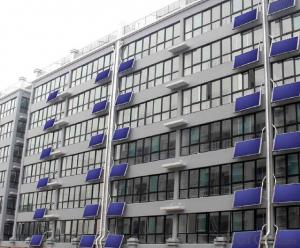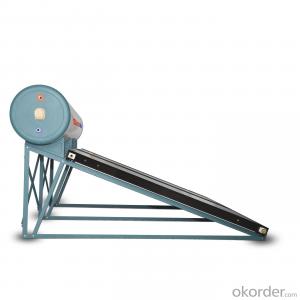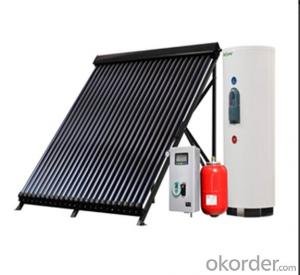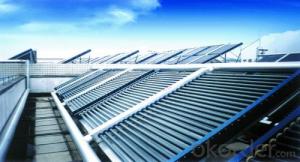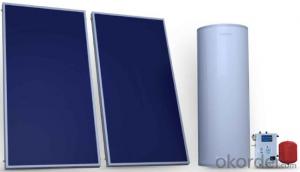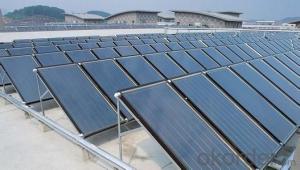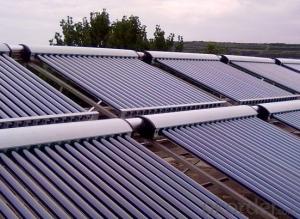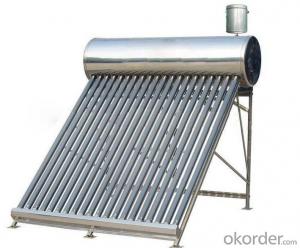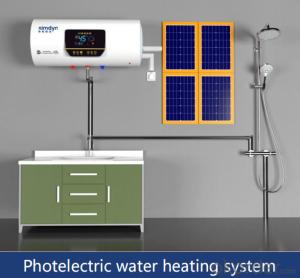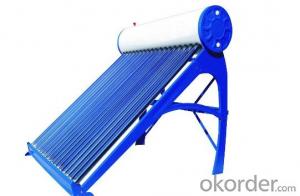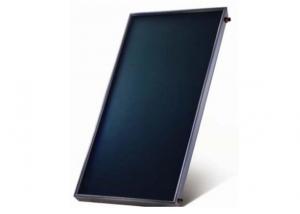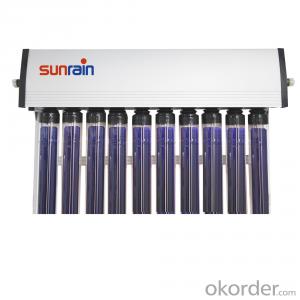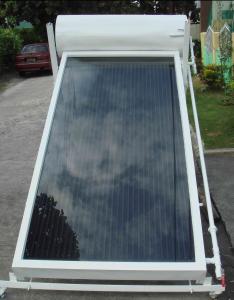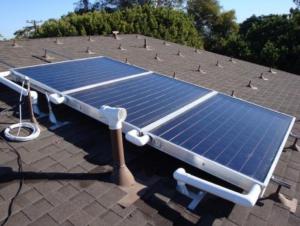Solar Water Heater Fitting for Balcony Hung Solar Water Heating System (Standard)
- Loading Port:
- Tianjin
- Payment Terms:
- TT OR LC
- Min Order Qty:
- 1 set
- Supply Capability:
- 10 set/month
OKorder Service Pledge
OKorder Financial Service
You Might Also Like
1.Structure of Balcony Hung Solar Water Heating System(Standard)
Solar water heating system is the most widely used product with regard to the solar energy application in daily life. Our Balcony Hung Solar Water Heating System(Standard) contains flat plate solar collector and a large water tank, in which the flat plate solar collector can make produce heat energy with high efficiency, meanwhile the automatic water compression system can ensure consistent water flow.
2. Main Features of Balcony Hung Solar Water Heating System(Standard)
economical flat plate solar collector: high price/ performance ratio;
seamless integration with modern architecture;
intellectual control to match human centered concept.
3. Balcony Hung Solar Water Heating System(Standard) Images
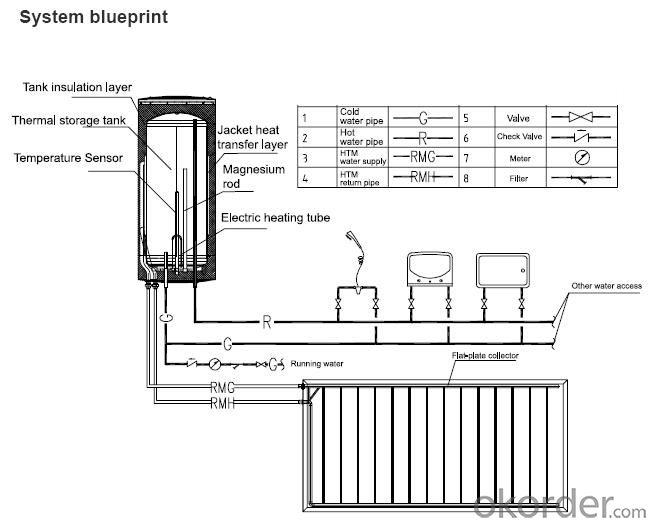
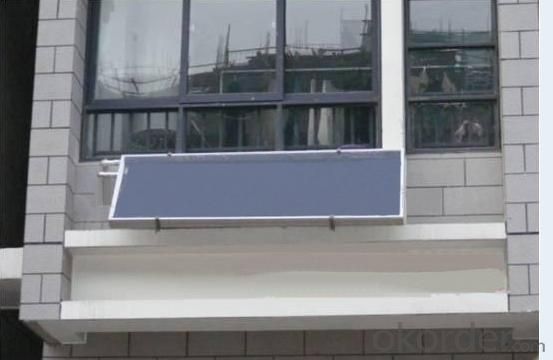
4. Balcony Hung Solar Water Heating System(Standard) Specification
| Model | Volume (L) | Tank Dimension (mm) | Solar Collector Model | Collecting Area (m2) | Balcony Width(m) |
| PJF-2-80-1 | 80 | Φ480×860 | P-G/0.6-L/L7-1.8-103 | 2 | ≥2.5 |
| PJF-2-100-1 | 100 | Φ480×1030 | P-G/0.6-L/L7-1.8-103 | 2 | ≥2.5 |
5. FAQ
1. Q: Do you have certificate for the products?
Re : Thank you for your attention to our products, and we have product certificate as follows:

2. Q: Can the products be modified?
Re:Yes, the products can be modified according to specific requirement. We'd like to advise you futhur communication in details with us.
- Q: Are there any limitations on the water temperature that can be achieved with a solar water heater?
- Yes, there are limitations on the water temperature that can be achieved with a solar water heater. The maximum temperature usually depends on factors such as the amount of sunlight available, the size and efficiency of the system, and the design of the solar collector. In general, solar water heaters can typically reach temperatures between 120 to 160 degrees Fahrenheit (49 to 71 degrees Celsius), which is sufficient for most household needs. However, achieving higher temperatures may require additional heating sources or the use of specialized systems.
- Q: How does the maintenance cost of a solar water heater compare to a traditional water heating system?
- The maintenance cost of a solar water heater is generally lower than that of a traditional water heating system. Solar water heaters have fewer moving parts, reducing the risk of mechanical failures and the need for costly repairs. Additionally, solar water heaters do not require fuel or electricity to operate, resulting in lower operating costs. However, periodic inspections and maintenance of solar collectors and the system's components may be necessary to ensure optimal performance.
- Q: What are the environmental benefits of using a solar water heater?
- There are numerous environmental advantages to utilizing a solar water heater. To begin with, it lessens dependence on fossil fuels like natural gas and coal, which are commonly employed for water heating purposes. By utilizing solar energy to heat water, we can make a substantial reduction in greenhouse gas emissions and combat the issue of climate change. Furthermore, solar water heaters do not release any air pollutants or harmful gases while in operation. This aids in the improvement of air quality and reduces the health hazards associated with air pollution. Moreover, solar water heaters necessitate minimal maintenance and boast a lengthy lifespan, which decreases the frequency of replacements and consequently minimizes waste generation. This not only helps in conserving resources but also reduces the environmental impact linked to the manufacturing and disposal of conventional water heaters. Additionally, solar water heaters depend on a renewable energy source - the sun. Unlike finite fossil fuels that contribute to resource depletion, solar energy is abundant and will remain available for the foreseeable future. By harnessing this clean and sustainable energy source, we can reduce our overall carbon footprint and contribute to a more sustainable and environmentally friendly future. In summary, the environmental benefits derived from employing a solar water heater are substantial. They encompass the reduction of greenhouse gas emissions, the enhancement of air quality, the conservation of resources, and the utilization of a renewable energy source. By adopting solar water heating technology, we can actively partake in mitigating climate change and transitioning towards a cleaner and more sustainable energy system.
- Q: What is the lifespan of the solar collectors used in a solar water heater?
- The durability of the solar collectors used in a solar water heater can vary due to multiple factors, including the quality of the collectors, the maintenance and care they receive, and the climate they are exposed to. However, with proper maintenance, high-quality solar collectors can last for 20 to 30 years or even longer. The lifespan of the solar collectors mainly depends on the durability of their components, particularly the absorber plate and the glazing materials. The absorber plate, responsible for capturing the sun's energy and transferring it to the water, is typically made of materials like copper or aluminum with a special coating for maximum efficiency. These materials are designed to endure prolonged sunlight exposure and thermal cycling without significant deterioration. The glazing materials, usually tempered glass or a transparent polymer, shield the absorber plate from external factors while allowing sunlight to pass through. The quality and thickness of the glazing can impact their lifespan. High-quality glazing materials are designed to resist UV degradation, extreme temperatures, and impacts from hail or debris. Regular maintenance and inspections are crucial for extending the lifespan of solar collectors. It is recommended to periodically clean the collectors to remove dust, debris, and any buildup that may hinder their efficiency. Additionally, it is important to take proper precautions to prevent freezing or excessive pressure within the collectors in colder climates. In conclusion, by investing in high-quality solar collectors, maintaining them regularly, and safeguarding them from severe weather conditions, their lifespan can be significantly extended, ensuring dependable solar water heating for many years to come.
- Q: How does a solar water heater perform in areas with high salt content in water?
- A solar water heater may face some challenges in areas with high salt content in water. The salt can cause corrosion and scaling in the system's components, reducing its efficiency and lifespan. Regular maintenance and proper water treatment are necessary to mitigate these issues and ensure optimal performance in such areas.
- Q: Solar water heater what tube?
- The utility model relates to a solar water heater, which is a device for converting solar energy into heat energy, which is used for heating water from low temperature to high temperature, so as to meet the requirement of hot water use in people's life and production. According to the structure of the solar water heater is divided into vacuum tube solar water heater and flat type solar water heater, mainly vacuum tube solar water heater, occupy 95% of the domestic market share. Vacuum tube type solar water heater is composed of a heat collecting pipe, a water storage tank and bracket and other related parts, converting solar energy into heat energy mainly rely on vacuum tube, vacuum tube using the principle of cold water sinking floating, the water circulation and desired hot water.Aluminum plastic pipe is a kind of middle longitudinal welded aluminum pipe, the inner and outer layer of polyethylene plastic and between layers of hot melt adhesive
- Q: Can a solar water heater be used in areas with limited electrical supply?
- Yes, a solar water heater can be used in areas with limited electrical supply. Solar water heaters rely on the sun's energy to heat water, so they do not require a constant electrical supply. This makes them ideal for areas where electricity is limited or unreliable, as they can still provide hot water using renewable energy from the sun.
- Q: What are the installation requirements for a solar water heater's expansion tank?
- Depending on the specific model and manufacturer, the installation requirements for an expansion tank in a solar water heater may vary. However, there are generally accepted guidelines that should be followed. First and foremost, it is crucial to ensure easy access to the expansion tank for maintenance and inspection purposes. This can be achieved by providing sufficient clearance around the tank and ensuring that it is not obstructed by any other equipment or structures. The expansion tank should be installed on the cold water supply line, typically near the inlet of the solar water heater. This allows it to effectively absorb the increased volume of water when it expands due to heating. It is important to adhere to the manufacturer's instructions regarding the specific location and orientation of the tank. In terms of plumbing, appropriate fittings and connectors should be used to connect the expansion tank to the cold water supply line. Using high-quality, leak-proof connections is essential to prevent any water leaks. Additionally, a pressure relief valve may be required to prevent the system from becoming over-pressurized. To prevent any movement or damage, the expansion tank should be securely supported. This can be achieved by using brackets or straps to anchor the tank to a wall or another stable structure. Prior to installing the expansion tank, it is advisable to consult the manufacturer's instructions and guidelines to ensure that all specific requirements are met. It is also beneficial to seek guidance from a professional plumber or solar water heater installer to ensure that the installation is carried out correctly and in compliance with local codes and regulations.
- Q: How does a solar water heater affect water heater installation time?
- A solar water heater can significantly reduce the installation time of a traditional water heater. Since solar water heaters use the energy from the sun to heat water, they don't require complicated plumbing or electrical connections, which simplifies the installation process. Additionally, solar water heaters are often pre-assembled and come with detailed installation instructions, making it easier and quicker for professionals to install them compared to conventional water heaters.
- Q: How does a solar water heater impact the water temperature consistency in a household?
- A solar water heater helps maintain consistent water temperature in a household by using the sun's energy to heat water. This means that even during periods of low electricity or gas supply, the solar water heater will continue to provide warm water, ensuring a consistent and reliable source of hot water for various household needs.
Send your message to us
Solar Water Heater Fitting for Balcony Hung Solar Water Heating System (Standard)
- Loading Port:
- Tianjin
- Payment Terms:
- TT OR LC
- Min Order Qty:
- 1 set
- Supply Capability:
- 10 set/month
OKorder Service Pledge
OKorder Financial Service
Similar products
Hot products
Hot Searches
Related keywords
